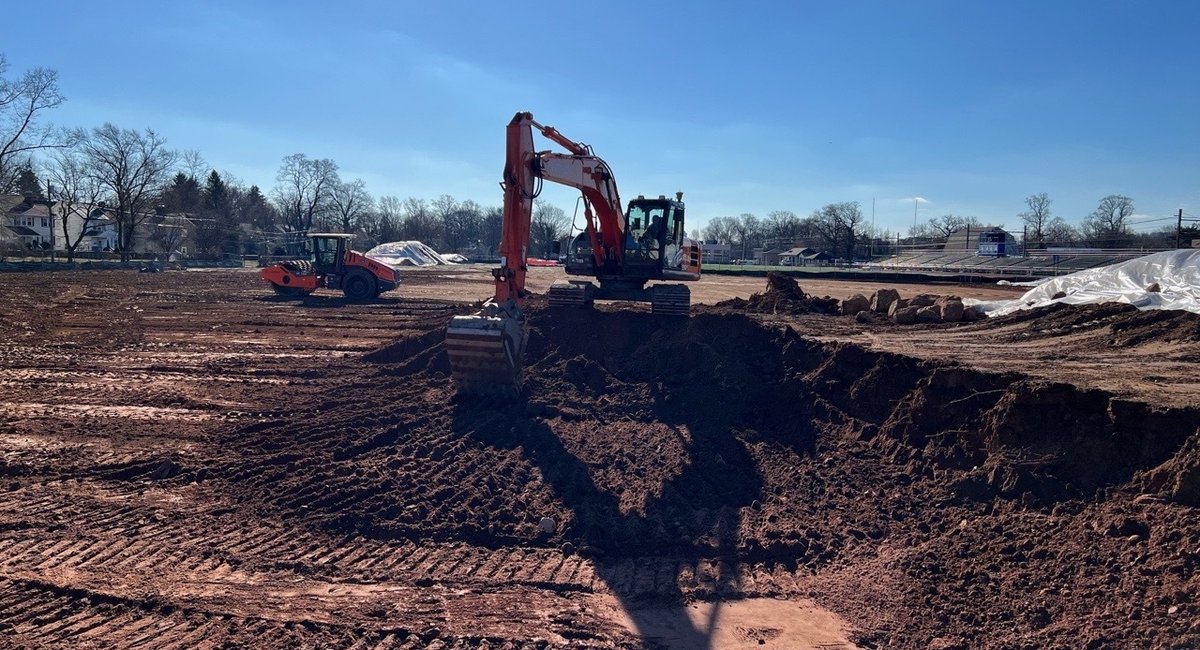A turf war is spreading across New Jersey.
A contentious dispute over a plan to install artificial turf in an athletic field at Montclair has become the latest example of growing concern on both sides of the Hudson River about the environmental and health effects of the material. Critics of artificial grass say it creates heat islands, and worry that the “crumb rubber” used in the subsurface is toxic. Supporters of the turf say it requires less maintenance and is easier on young athletes’ bodies.
But the debate over plans for an $8 million synthetic turf varsity baseball field with batting cages, bullpens and more at Woodman Field has devolved to an unusual degree.
“They’re taking the garden out of the Garden State, everywhere,” said Montclair resident Anna Grossman. “And we are paying for it with our health and we are paying for it with our tax money, too.”
Critics of the project have teamed up with advocates in neighboring communities who are waging their own campaigns against artificial turf. The Board of Education, which is spearheading the renovations, has responded with a lawsuit seeking to uphold approvals of the project scheduled to be finished this spring. The board did not respond to inquiries, but critics say it’s an attempt to ram the project through despite opposition.
“In a town, in a state where we consider ourselves top on our environmental game this is an atrocity that’s happened here in Montclair, N.J.,” said Allison Sargent, who has lived across the street from the field for more than 70 years.
Residents from six neighboring communities waging their own fights against turf are also involved in the debate over Woodman Field. It’s gotten so nasty that Westfield resident Jean Lehmberg said when she goes to the grocery store “I feel like I have a target on my back.”
The activism comes amid growing national awareness about artificial turf, which requires less maintenance than a grass field. The union representing NFL players has spoken out against synthetic fields, saying they are more likely to cause injuries than grass fields. A bill in the New York state Senate would put a moratorium on new fields pending further environmental review. Meanwhile, New York City’s parks department plans 50 new turf fields over the next five years.
“I think it’s important for us to pause, examine and then determine how we move forward,” said New York state Sen. Zellnor Myrie, who hoped he could get the moratorium bill passed this session “in the interest of helping to save our planet.”
Some 20 trees were cut down to make way for Montclair’s turf field, which still hasn’t been installed amid the opposition and a stop work order from the Town of Montclair. Planned renovations include areas for tossing discuses and javelins.
Local parent Tyler Mathison spoke in favor of the turf project at a public meeting in October, saying the material was safer for young athletes.
“The science is incomplete. Sometimes conflicting, often ambiguous. It is not definitive,” he said. “What we do know as parents, and what our student athletes know from playing on the current unsafe surfaces and suffering injuries [is that] consistent levels of synthetic turf is safer for them.”
Artificial turf is like a carpet. On top is a plastic layer that is made to look like grass. Below that is typically a subsurface of “crumb rubber” made of recycled tires that have been ground down. That material typically contains over 400 chemicals, many of them carcinogenic. A Yale School of the Environment article described tires as “ a significant source of air, soil and water pollution that may affect humans as well as fish, wildlife and other organisms.” Nevertheless, turf is a popular surface for athletic fields because it doesn’t require water or sun, and only needs to be replaced every eight to 10 years.
“As [turf fields] degrade in weather and sunlight, they will break up into microplastics that can then enter water supplies, wildlife, fish, and that’s something that’s a huge concern,” said Dr. Sara Evans, a professor in the Department of Environmental Medicine and Public Health at the Icahn School of Medicine at Mount Sinai. “ It’s a very shortsighted approach to be putting out a product into your community that… could potentially contaminate the environment and expose the youth of the community.”


Leave a Reply